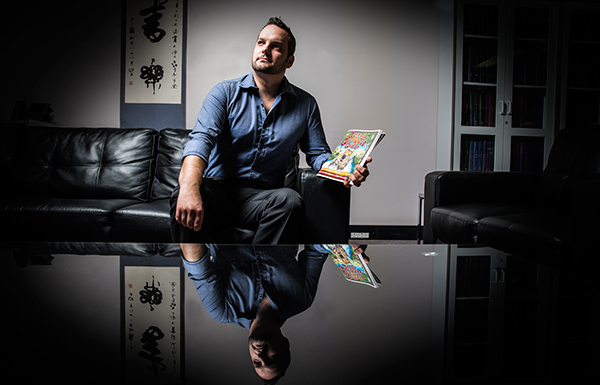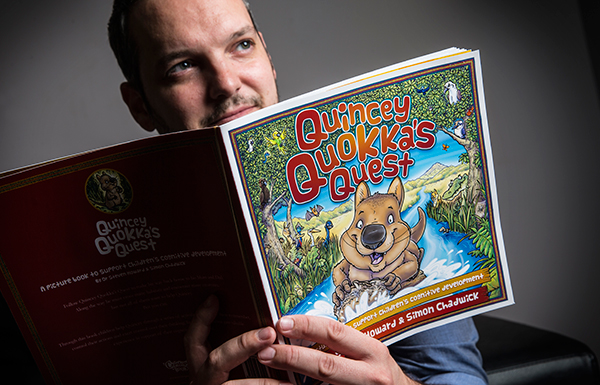January 19, 2015
Brain-training children’s book fast-tracks development
An innovative new children’s book has been launched to aid self-control, school readiness and academic success.

An innovative new children’s book has been launched to aid the development of the core cognitive abilities underlying self-control, school readiness and academic success.
Using the latest research in child development, Dr Steven Howard (pictured above) from UOW's , wrote the book, Quincey Quokka’s Quest, in conjunction with UK-based author and illustrator Simon Chadwick.
The book asks children to help the main character, Quincey Quokka, through a series of activities that require them to remember, control their actions and exert control over their thinking.
Dr Howard, an expert on the cognitive development of children in the preschool and primary school years, said the book was designed to help develop children’s abilities to control their thoughts and behaviours – abilities that have been implicated in school readiness, academic success, impulse control, social competence, peer acceptance and proficiency in learning more generally. “Put simply, the ability to self-regulate in early childhood sets the stage for a wide range of abilities and achievements in later life,” Dr Howard said.
The motivation for creating this book came from parents and educators inevitably asking 'What can I do to help my child?' at the end of each of Dr Howard’s studies into the nature, development and importance of self-regulation.

“This is where research has tended to be deficient,” Dr Howard said. “Much of the research to date is on expensive computer-based brain training programs, which typically cost hundreds or thousands of dollars and provide, at best, only modest gains. They are rarely designed for young children, even though research suggests that the strongest and longest-lasting benefits occur when we intervene early in life.”
Given that these brain-training programs use well-established psychological principles and practice, Dr Howard set about creating a low-cost, family and educator-friendly way to foster young children's executive functioning and self-regulation.
The result is a colourful, creative and fun children’s picture book that aims to not only promote children’s development, but also teach children about Australian animals, environments and rhyme in a vibrant and engaging way. Dr Howard said that by helping Quincey Quokka, children are able to practice their cognitive abilities, which is at the heart of the improvement.
In fact, recent research has shown that just reading stories to children does not show the same positive effects as when children are also engaged in the book’s cognitive activities. In an assessment of the efficacy of Quincey Quokka’s Quest on cognitive development, positive effects were found regardless of whether the book was read individually or in a group of more than 20 in a preschool – indicating that the book can be an effective tool for parents and educators alike.
More information: Quincey Quokka's Quest by Dr Steven Howard and Simon Chadwick (published by Ceratopia Books) is available online at www.quinceyquokka.com and on , as well as at the UOW UniShop.
Media contact: Elise Pitt, Media & PR Officer, UOW, +61 2 4221 3079, +61 422 959 953 or epitt@uow.edu.au.
About Early Start:
From the simple premise, “every child deserves the best possible start to life” we are developing the most sophisticated teaching, research and community engagement initiative in higher education. Early Start is a $44million transformational project that aims to create and enrich life opportunities for young Australians from birth – 12 years.
It consists of building a world-class Children’s Discovery Space (Australia’s only example of a USA-styled ‘children’s museum’ promoting learning through play and the importance of life-long learning); an international hub for multidisciplinary research tackling issues as varied as early cognitive development, healthy lifestyles and inspiring creativity in our young; cutting-edge early childhood courses; and a network of preschools across New South Wales which act as test beds for putting pioneering research into practise.